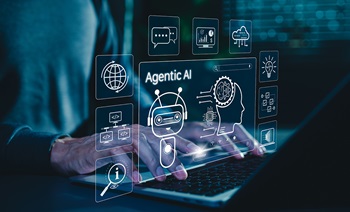<p align="center" style="text-align:center;"><em>AI agents have the potential to transform grocery shopping from a manual, app-based task into an automated, voice-driven agentic AI experience that plans meals, manages budgets, and places orders on behalf of shoppers, with big implications for retail operations.</em></p><p>By Doug Baker, Vice President, Industry Relations, FMI</p><img src="https://www.fmi.org/images/default-source/blog-images/agentic-ai-image.tmb-large-350-.jpg?Culture=en&sfvrsn=a8e20535_1" style="float:right;margin:10px;" class="-align-right" alt="A man's hand type on a computer laptop with an overlays screen of graphics depicting and AI agent. " sf-size="100" /><p>I knew this was coming. The FMI Technology Council has been discussing how quickly AI would evolve beyond how large language models are currently used, and our advisors at Oliver Wyman have reinforced that trend. What I didn’t expect was how fast the next step, known as agentic AI, would emerge so quickly, transforming AI from a conversational tool into an autonomous, goal-driven system that mimics human decision-making. Think of it this way: if the large language model is the brain, the agent layer gives the LLM “hands and eyes.” </p><p>When <a href="https://openai.com/index/introducing-chatgpt-agent">OpenAI released its ChatGPT Agent framework</a> in July 2025, it ushered in a new chapter for automation. Within days, developers tested agentic shopping capabilities. These new systems can analyze household budgets, scan weekly promotions, suggest recipes, and even check what’s already in your pantry. It’s nowhere near perfect yet because the content is not organized, but you can see how fast the marketplace could move. Enabling shoppers to automate planning and shopping via AI agents and outside their mobile apps is disruptive.</p><p>The difference is autonomy. Traditional chatbots respond to commands; AI agents act on goals. Very soon, if not now, AI agents can compare grocery prices across retailers, factor in loyalty programs, and keep total spending within a set budget. Coupled with the advances in AI chat voice functionality, a shopper can simply say, “Plan my weeknight dinners under $200 and order what I need,” and the AI handles the details from menu creation to online checkout. Involved in all this is ecommerce, consumer trust, loyalty and delivery which all are having advances and changes at breakneck speeds. </p><h5>Innovation Requires Collaboration</h5><p>The implications are both exciting and challenging for food retailers. AI agents can extend personalization beyond recommendations to actionable automation. Imagine systems that automatically update shopping lists when items run low or reorder based on past purchases and expiration dates, like what we would read in a Ray Bradbury futuristic novel years ago. </p><p>These same agentic tools are also emerging behind the scenes, automating inventory replenishment, managing task schedules, and assisting customer-service teams. The goal isn’t to remove the human touch but to give store associates more time to focus on service and freshness, two things technology can’t replicate. There are certainly more long-term generative AI implementation challenges to consider and discuss.</p><p>The pace of innovation is accelerating, which makes it essential for food industry leaders to gather, compare notes, and explore these technologies together. That’s why <a href="https://www.fmi.org/midwinter-conference">FMItech at Midwinter</a> in January and <a href="https://www.fmi.org/grocerylab">GroceryLab</a><strong> </strong>in June are so important. These programs give retailers, suppliers, and technology partners a chance to discuss agentic AI opportunities, partnerships, implementation strategies, and assess where automation can deliver measurable value without losing the personal connection that defines the grocery experience.</p><h5>Preparing for What’s Next</h5><p>As we’ve seen through FMI’s<strong> </strong><a href="https://www.fmi.org/forms/store/ProductFormPublic/the-state-technology-2025"><em>The State of Technology 2025</em></a> research, the grocery industry is shifting from experimentation to execution. The rise of AI agents will accelerate that change. Retailers that integrate these tools responsibly will gain speed and precision in decision-making while maintaining trust with their shoppers. Foundational to this advancement is collaboration among industry partners. </p><p><a href="https://www.fmi.org/midwinter-conference/b2b-meetings/fmitech" class="button">FMItech at Midwinter</a><strong></strong></p><p><a href="https://www.fmi.org/grocerylab" class="button-secondary">GroceryLab</a><strong></strong></p>
[#item_full_content]





